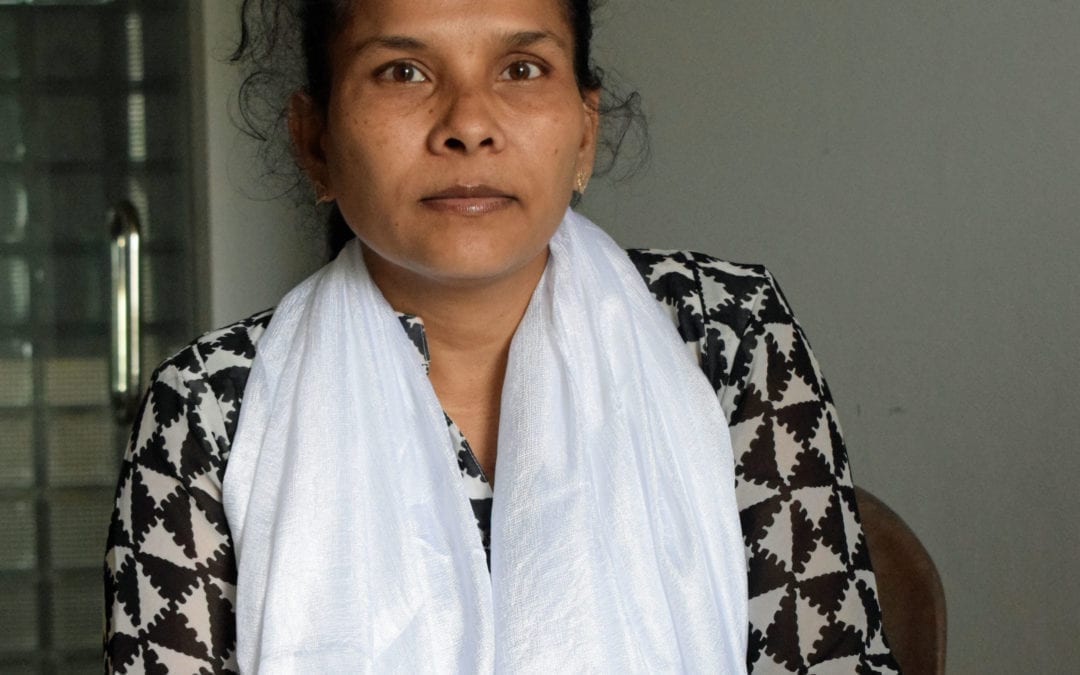
Apr 5, 2018
I am Khadiza Akhter, vice president of the Sommilito Garments Sramik Federation (SGSF), where I have worked since 2008.
I started to work in a garment factory at a very young age. My family was poor, so I did not have the luxury to continue my education. One day I came to know about a federation (BIGUF) which was led by women. As women leaders were rare I went to attend one of the sessions of that federation. There, for the first time, I heard about labor law.
Factories did not follow Bangladeshi labor law. When I tried to raise voice against malpractices, my supervisors threatened my job. Our factory did not have an active union so I could not take any legal action against such abuse, but I received training in labor law from my federation. Eventually I was blacklisted in the garment sector for my union work, but BIGUF offered me a job and I worked there for six years as an organizer.
In 2008, I joined Sommilito Garments Sramik Federation (SGSF). And I did try to unite workers to form an active union for a factory in Dhaka, but the government rejected the registration of the union.
The Rana Plaza disaster changed perspectives. The entire working community realized that same kind of disaster could have happened to them, so they became more focused on a safe working environment. Many workers came to Ashulia to protest.
SGSF started to work with union members to identify unsafe buildings. Our trained organizers conducted fire and safety training for educating general members. They were interested to come to our training so that they could understand legal requirements for ensuring the safety of the factories.
The Accord on Fire and Building Safety in Bangladesh (the Accord) and the Alliance for Bangladesh Worker Safety (the Alliance) contributed to ensuring the safety of the factories but there is lots more work to be done. For instance, no routine or monthly check up is done in most factories. Additionally, fire extinguishers and other equipment are not maintained by the management. Here, almost all the safety committee exists only on paper. We are now working in this arena for maintaining the standard of fire safety. This is a big task in the future.
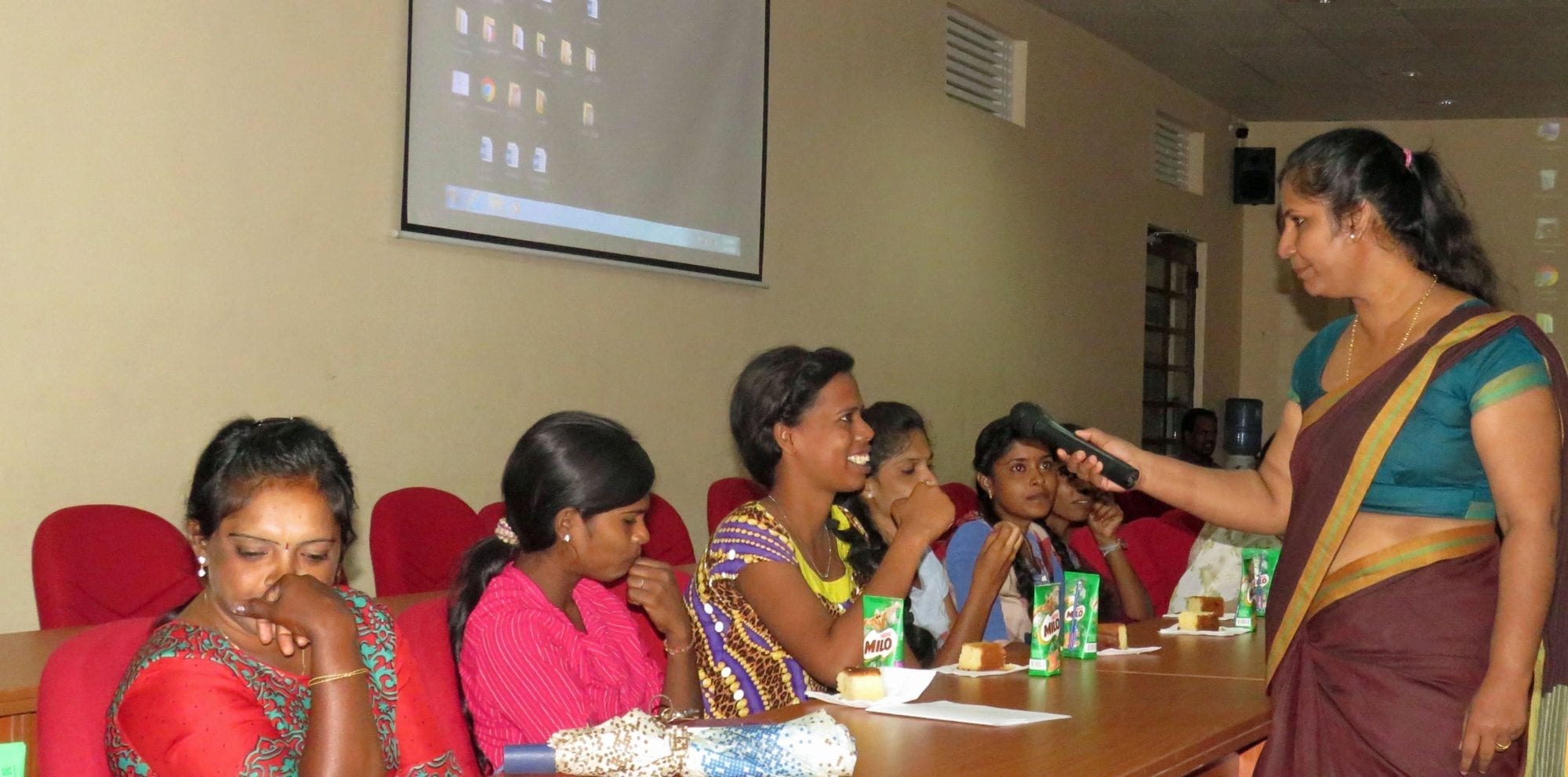
Apr 5, 2018
Nearly 50 cleaning-sector employees from offices throughout Jaffna, Sri Lanka, discussed strategies for addressing gender-based violence at work and how unions can be instrumental in empowering workers to tackle the problem during a recent Solidarity Center training.
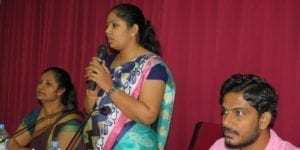
For most participants, the gender equality at work session was their first exposure to the issue. Credit: Solidarity Center/Suthakar
The 28 women and 18 men who provide cleaning services for courts, banks and finance companies began the daylong workshop with a discussion on how workers can be discriminated against based on gender, one aspect of which is gender-based violence at work.
Gender-based violence at work takes multiple forms, including physical and verbal abuse and sexual assault targeted at an individual based on gender. The Solidarity Center is taking part in a global campaign for passage of an International Labor Organization (ILO) convention covering gender-based violence at work.
For most participants, the gender equality workshop was their first experience discussing the issue, and some shared that were not aware of constitutes gender- based violence at work.
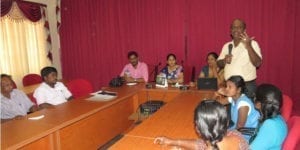
Credit: Solidarity Center/Suthakar
Participants also noted that some of their transgender co-workers frequently are bullied by employers, co-workers and office staff.
Participants also heard from labor lawyers on their fundamental workplace rights, with some saying they did not know they had the right to be paid overtime, double pay on holidays or even that they could form a union. Participants raised many questions about how best to overcome the obstacles they faced in forming unions.
Because “cleaning-sector employees are a very vulnerable working sector, this session aimed to improve their awareness level of basic labor rights and practices,” says Rubini Nishanth, Solidarity Center legal counsel in Jaffna, who moderated the workshop.
Apr 5, 2018
My name is Shamima Aktar and I am a responsible member of my society working as an organizer at Bangladesh Garment and Industrial Workers’ Federation (BGIWF). This was not the case 10 years back. My father was diagnosed with cancer and our family of seven had difficulty making ends meet. Thus, I had to begin working when I was in eighth grade in a small organization that help street children in my community.
From then on, I never looked back, I worked in a garments factory and still managed to acquire a GPA 5 in SSC examination, and this made my father proud. But I did not forget about the hardship that my colleagues and I went through in the garments factory. We were deprived of our basic rights and even more, we did not even know what our rights were. There were chronic shortage of drinking water, bathroom facilities and space for moving around. I always wished I could do something to improve the conditions, do something so that we could receive the minimal facilities.
Then in 2014, I joined BGIWF. I got the opportunity to struggle toward those goals of mine. Things were already on the move due to the Rana Plaza tragedy just a year back. Infrastructure was improving, emergency exit and fire safety was put in place and many factories were relocated from residential buildings to Ashulia, Savar and Narayanganj.
I believed that the workers must be aware of their rights and they must be united to achieve them. That is what we do at BGIWF—we train them to let them know what they deserve and we empower them so that they can claim their rights from the factory owners.
This work has put me in difficult situations and I would like to share one such event. In one factory where we helped to organize a trade union, the factory management called a meeting with us and the union to talk about a demand made by the worker’s union that the salaries must be paid [in a timely fashion]. The factory management would not grant it, and at one point we were locked and beaten. But what moved me was that hearing about our abuse, 17 trade unions around the community immediately came to our aid and barricaded the factory we were in.
Thus, I gathered my courage that the work we were doing was meaningful to many. The workers needed us on their side to be able to live in peace and I wish to [continue organizing workers] no matter how difficult it is for me.
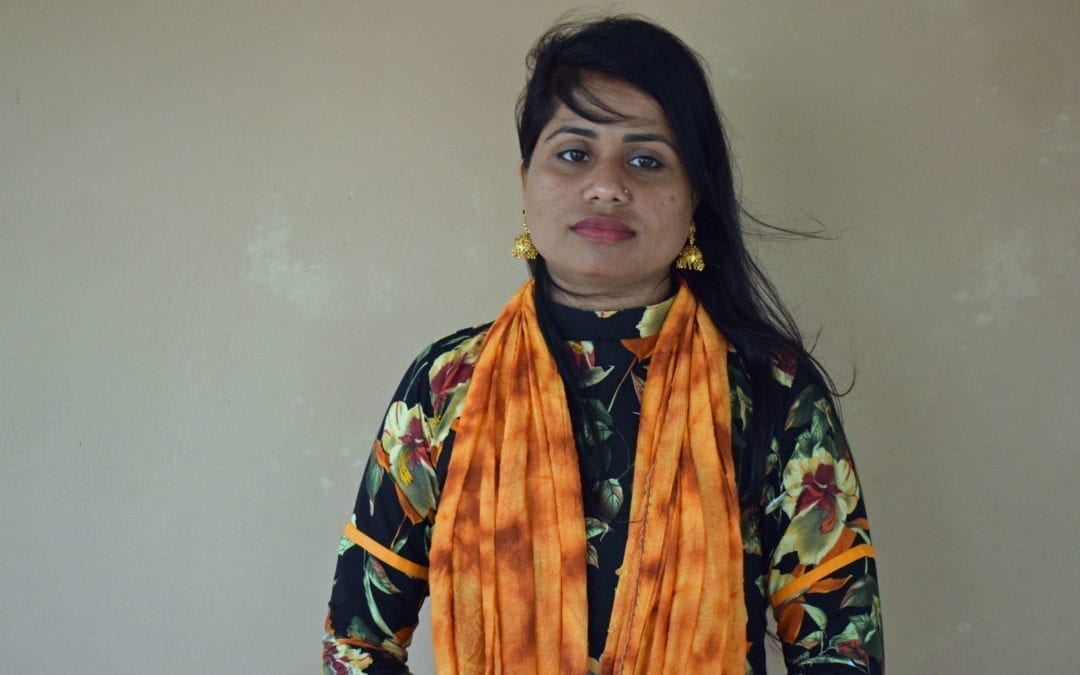
Apr 3, 2018
I am Monira Akter, working with Bangladesh Independent Garment Workers Union Federation (BIGUF) as an organizer for the past six years. I saw how my elder sister was abused and sometimes beaten in her garment factory, and that is when I decided that I wished to work for the rights and safety of all those brothers and sisters of the factory.
They were forced to work long hours without extra payment, sacked if absent for a day or two and had no trade union to voice their claims. It distressed me when I saw my sister returning home at night tired and sick with no time to spend with us or her husband. But we had no choice as we had five mouths to feed with no father or elder brother.
After the Rana Plaza disaster, there have been major changes which had not occurred in many years. Building and fire safety gave a sense of security for the workers in their workplace. They feel they will not lose theirs or their close ones’ lives in an accident just like Rana Plaza and thus are able to work feeling secured. Moreover, I am proud that we have been able to create leaders among the workers by organizing them into trade unions. In the past this would have been close to impossible.
I have worked day and night, went to gates of factories to talk to the workers, walked with them to their homes to earn their trust and to make them aware of how they are being exploited and deprived of their rights. So far, we have united 2,250 workers into trade unions and they say that we give them courage and hope. For me, these words are enough to encourage me to work on for them.
Some of their stories moved me. Once one of them told me that due to some reason a worker was ordered to leave the job immediately but instead she called our office right away. The manager seeing this told her to come back and keep working! This showed us how relevant we have become to the lives of workers and how we can influence the decisions of factory owners on worker rights.
A second story was about Mitu, a worker who was pregnant and submitted her resignation to management. She requested her benefits, but the manager would not allow it. She came to BIGUF informing us about her situation and we promised her our assistance. After many negotiations and heated conversations, we managed to extract all the dues she [legally] deserved without having to resort to legal proceedings.
This is how the garment workers lives are being transformed. The fact that I receive salary for this work is not my motivation. My husband discouraged me to work in this but I still adhere to my principles and wish to stay beside the workers who need of me.
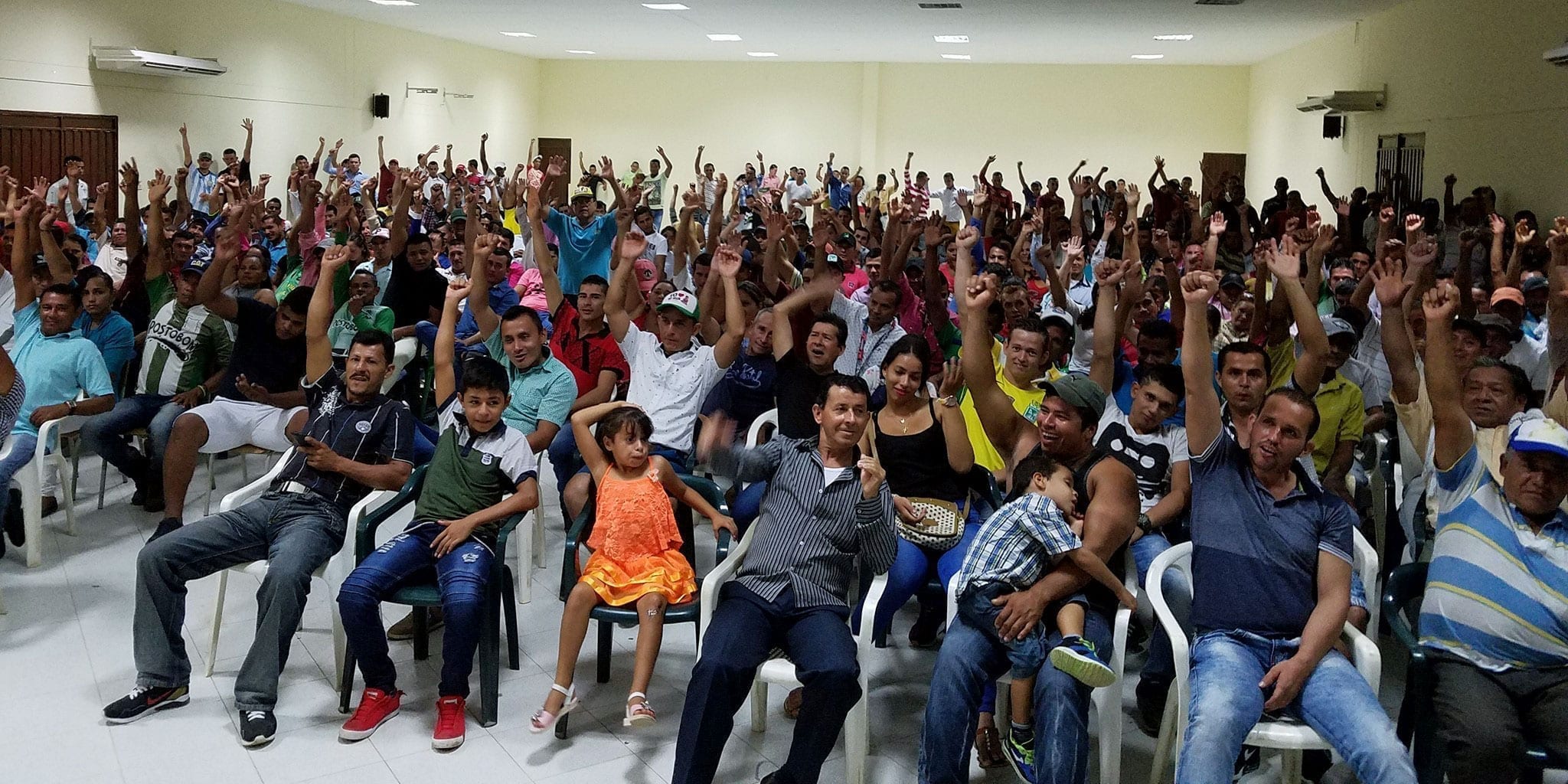
Mar 28, 2018
After years of hardship for workers due to illegal corporate employment practices and a lack of recognition of their rights, a Colombian union of subcontracted palm workers won direct employment contracts for 730 of its members. Successful negotiations followed a 20-day strike earlier this year that brought management of the largest palm oil producer in the country, Indupalma, to the table.
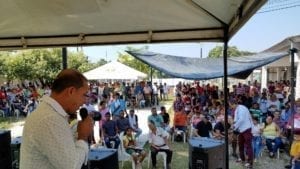
Jorge Castillo, UGTTA president, conducts the ratification vote for the accord. Credit: Digna Palma
Last year, the palm oil workers formed the General Union of Third-Party Agribusiness Workers (UGTTA). Despite the region’s history of threats and violence against workers who form unions, the UGTTA has grown from 248 to some 1,010 members. The union reports four members received death threats in 2018.
The Ministry of Labor determined in 2016 that Indupalma illegally subcontracted the majority of its 1,200-person workforce. The company imposed a model of phony cooperatives, essentially classifying workers as owners without labor rights or decent working conditions. As subcontracted workers, the palm oil workers had no rights under Colombia’s labor laws, including the minimum wage, freedom of association and the right to negotiate working conditions. They walked off the job outside San Alberto January 25 to demand formal work status.
Beginning in 2017, a broad coalition of palm workers’ unions known as the Worker Pact (Pacto Obrero) provided critical organizing and advocacy support, which, in addition to a sound legal strategy and international pressure, prompted the Ministry of Labor to intervene and facilitate a negotiation that led to a formalization accord between UGTTA and Indupalma.
The accord finalized on March 15 calls for the creation of two new affiliate companies (with sufficient capital and investment to meet legal obligations to the workforce) that will directly employ workers from two Indupalma work sites in the Magdalena Medio region. The accord also explicitly abolishes the use of the cooperative model. This process is to be completed by August 2018.
The union unanimously ratified the accord and has expressed deep gratitude for the solidarity it has received. The 730 members who will become direct employees will enjoy the full protection of the labor law and will be entitled to the minimum wage, social security benefits, health and safety standards, and organizing and collective bargaining rights. This win has lifted the entire San Alberto community, as families anticipate that improved wages and job security will provide additional resources that benefit their households and help educate their children.
The Solidarity Center will continue to work alongside the UGTTA and Pacto Obrero to monitor enforcement of the accord.







